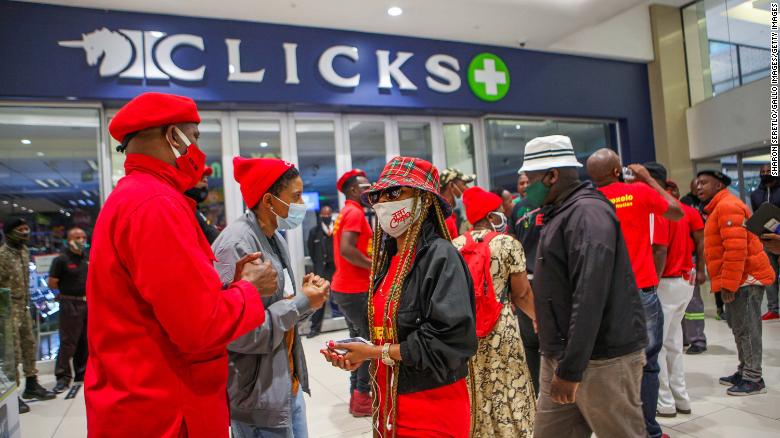Johannesburg, South Africa Two advertisements, one showing a black woman’s hair labeling it “frizzy and dull,” the other showing blonde hair, labeling it, “fine and flat” and “normal” set off protests at one of South Africa’s largest retail pharmacies.
The content and images of the advert were provided to Clicks by one of their suppliers, TRESemme — an American brand of hair care products, according to the company’s Group CEO, Vikesh Ramsunder.
The company issued an apology in a statement released Monday and said it had removed the images, “which go against everything we believe in,” adding it does not “condone racism.”
He added that all employees involved in publishing the offensive advertisement have been suspended.
In the meantime, Clicks has said it will remove all TRESemme products from its shelf and replace it with locally sourced hair care brands, of which it has an extensive range already.
All Click stores will also close for a day on Wednesday 9 September, the Group CEO said.
“We will use this opportunity to engage directly with all our store staff across the country, to provide counseling and support,” Rasmunder said in the statement.
However, the removal of the advertisements from Clicks website, apology and store closures has done little to quell the protests.
The protests, still ongoing, are led by the opposition party Economic Freedom Fighters (EFF) which has used social media to denounce the adverts as “racist” and “dehumanizing.”
South African politician, Julius Malema formed the EFF in 2013 and has been at the forefront of the protests against Clicks, calling on all its stores to be permanently closed.
In a statement, he said the advert insinuated that black people and their identities exist as inferior to that of white people.
“It is an assertion that white standards of beauty are to be aspired to and features of black represent damage, decay, and abnormality,” the statement said.
In videos shared on social media, protesters dressed in red were seen throwing shelves in one of the Clicks stores.
Party leader Malema posted on Twitter for “fellow fighters and ground forces; ATTACK” as the EFF called for a full week of protests.
On Tuesday, the retail chain won an interim court interdict to stop the EFF from “intimidating and threatening” Clicks employees.
The retail chain said 425 of its stores have been targeted, with many prominent South Africans also taking to social media to comment on the advert.
Local media also reported that a group of people threw a petrol bomb into one of its stores in Emalahleni, a local municipality in the southern African country.
Local media also reported that a group of people threw a petrol bomb into one of its stores in Emalahleni, a local municipality in the southern African country.
In a country where faith in politics and politicians is constantly questioned because of widespread corruption, some South Africans online, even EFF supporters, worried that the party’s lead in the protests against Clicks would detract from the real issue of racism.
“We as South Africans embraced the Black Lives Matter movement because that came from abroad, but with this, with such a clearly racist advert in South Africa, people instead focus on EFF and politics,” says EFF supporter Thabo Moerana.
White beauty standards
Current Miss Universe, South African Zozibini Tunzi said the ad was disrespectful.
“Not only is this disrespectful to black lives, but it is also evidence of an absence of representation and diversity within the organization, ” she wrote on her official Twitter account.
Historically, beauty standards have been set by and for white women, leading to women with short, kinky hair and dark skin feeling inferior.
Tunzi’s Miss Universe crowning in December 2019 helped shift the status quo of the pageant whose definition of beauty had excluded black women and their natural hair
Perceptions of double standards and racism allegations have been a subject of continued discussion in South Africa, 26 years after the end of the brutal systemic racism of apartheid.
In 2016, a video posted on Instagram went viral, showing 13-year-old Zulaikha Patel and fellow schoolmates in a tense standoff with private security guards.
The students protested after they were told by teachers that their hair is “exotic” and that their Afros needed to be tamed.
It is not the first time in South Africa where marketing campaigns have resulted in a backlash against the brand.
In 2018, the EFF also led protests at Swedish retail giant H&M’s stores in South Africa over an online advert that showed a black child wearing a “coolest monkey in the jungle” sweatshirt.
H&M apologized for the ad and pulled the product from its stores globally.
>>>details



